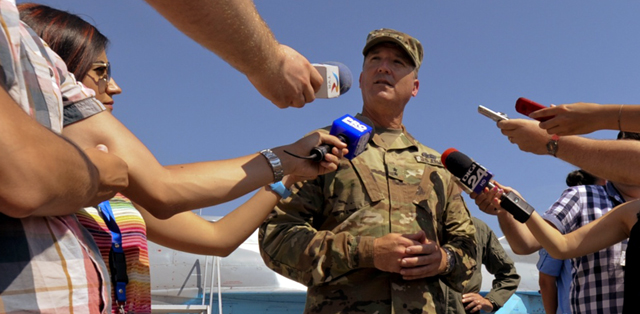
Deputy Adjutant General, Major General Matthew Beevers meets with reporters.
June 17, 2019 - By Jeff Jardine - While the Trump Administration in effect has ordered the Department of Defense to ban transgender troops from serving in the U.S. military, LGBTQ troops in the California National Guard have a staunch defender in their Deputy Adjutant General, Major General Matthew Beevers.
Headquartered in Sacramento, Beevers said he clearly values the service of transgender troops, respects their civil rights and right to serve, and will do everything within his power to protect their ability to continue serving.
The new federal regulations, which went into effect in April, prevent transgender troops from serving openly. It also blocks the use of funding by the Department of Defense or the Department of Health Services to pay for sex-change surgeries.
It requires transgender troops to serve only under their biological sex, impacting perhaps as many as 15,000 troops who identify as transgender. And the new policy prohibits anyone diagnosed with gender dysphoria and who has received either hormone or surgical treatment from joining the military. They can join if they have not received medical treatment.
In essence, the Administration’s new policy reinstates for transgender individuals the “Don’t Ask, Don’t Tell” policy implemented during the Clinton Administration in 1994 and ended by President Obama in 2011. Beevers sees the policy as detrimental to both their rights as individuals and to the readiness of an effective fighting force.
“Forcing out soldiers and airmen based solely on how they gender identify would have a deleterious effect on our readiness and effectiveness – it’s that simple,” Beevers said. “In order to be an effective warfighting and emergency response organization, it’s imperative that we be representative of the citizens we serve. Denying transgender service members the opportunity to serve makes us less representative of the overall population of California, less culturally astute and therefore, less effective. Every service member is an integral part of our organization.”
He said “Don’t Ask, Don’t Tell” was an “abject failure” and he was shocked that it wasn’t repealed until 2011.
“My sense is the repeal did two things. One, it enabled serving LGBTQ folks to serve openly – and I mean ‘bring your same sex spouse or significant other to the military function openly,’ ” Beevers said. “And that may be just symbolic, but I think attending a military function with your same sex partner was a fundamental turning point and had a profoundly positive impact on the culture across the Department of Defense (DoD).
“And second, with LGBTQ service members serving openly, it enabled LGBTQ citizens who want to serve to do so without having to lie – which “Don’t Ask, Don’t Tell” insanely required them to do. We have some hurdles to get over to enable transgendered folks who want to serve, but I’m confident we’ll get there.”
The California National Guard gets over 90 percent of its funding from the federal government, but is under control of the Governor of California while operating within the state. When they deploy out of state, they fall under the President’s control.
“However, if you are a member of the National Guard, the personnel policies that apply to you are federal,” Beevers said “That said, I want to make this absolutely clear – no transgendered service member in the Cal Guard will be removed under the current policy.”
A strong stance, indeed, but he said the Guard hasn’t incurred any pushback from the Defense Department, nor does he expect any.
“I think four other states (Oregon, Washington, New Mexico and Nevada) have followed California’s lead on highlighting the fundamental inequities of DoD’s current transgender policy,” Beevers said. “And yes, DoD can force us to comply with the new guidelines but it’s not going to come to that. As military officers, we must follow the lawful orders of our state and federal elected civilian leadership, even if we don’t agree – it’s a fundamental principle of our democracy.
“That said, we intend to fully explore every avenue outside the new transgender policy and every exception inside the policy to ensure anyone who is willing and able to serve has the opportunity – that’s also a fundamental principle of our democracy.”
Beevers is was among those scheduled to speak on June 13 during CalVet’s LGBTQ Inclusion Forum in Los Angeles, recognizing LGBTQ Pride Month. CalVet Secretary Vito Imbasiciani MD, a veteran and member of the LGBTQ community who served as an Army surgeon during “Don’t Ask, Don’t Tell,” will give the keynote address.
For more information, follow CalVet on Facebook, Twitter and YouTube.
Source: CalVet








